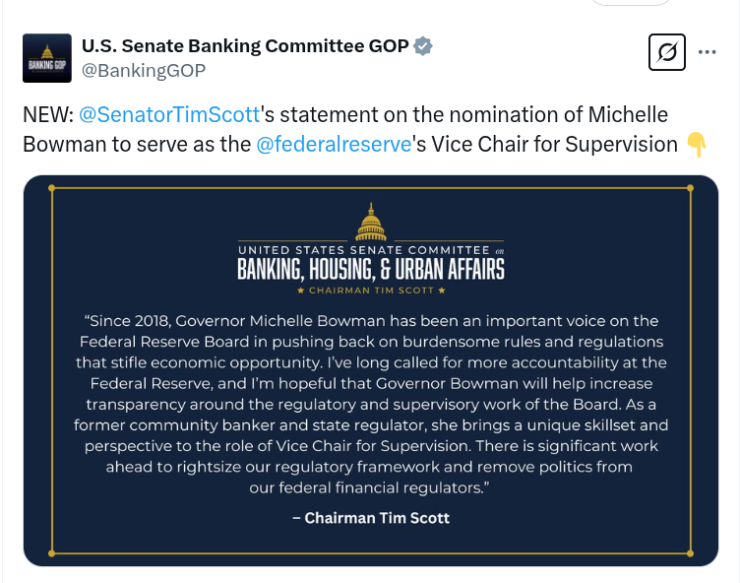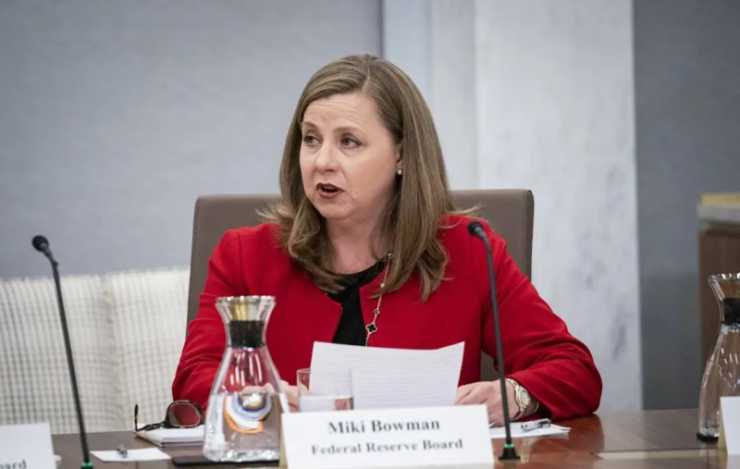President Donald Trump has appointed Federal Reserve Governor Michelle Bowman as the central bank’s new Vice Chair for Supervision, replacing Michael Barr, who resigned last month. Bowman, a longtime critic of overregulation in banking, is expected to take a more industry-friendly approach, a move welcomed by Wall Street and smaller lenders.
Bowman’s appointment signals a potential shift in the Fed’s regulatory stance, particularly concerning digital assets. She has expressed skepticism toward central bank digital currencies (CBDCs) while maintaining a measured openness to stablecoins and regulated crypto innovation. The change follows Barr’s tenure, which, while not outright hostile to crypto, was marked by heightened scrutiny of banks engaging with digital assets.
Bowman, a former Kansas banking regulator and executive at Farmers & Drovers Bank, has been a strong advocate for reducing regulatory burdens, especially on smaller banks. Since joining the Fed in 2018, she has chaired the central bank’s Subcommittee on Smaller Regional and Community Banking.

Her views contrast sharply with Barr’s regulatory approach. He was a key proponent of a 2023 proposal requiring banks to hold more capital, a plan Bowman strongly opposed. Trump’s decision to appoint her aligns with his broader effort to scale back financial regulations he describes as harmful to economic growth.
“The industry would be excited to see Miki Bowman appointed,” Goldman Sachs CEO David Solomon said in an interview last week, emphasizing the potential for banks to increase lending and stimulate economic activity under her supervision.
Bowman’s new role also coincides with Trump’s February executive order tightening control over independent regulatory agencies. The order mandates the Fed to submit draft regulations for White House review, excluding monetary policy decisions. Her position as a Fed governor remains unchanged, and she will continue to serve on the Federal Open Market Committee (FOMC), which sets interest rates.
A Shift in Crypto Oversight?
Bowman’s appointment could mean a different approach to digital assets at the Fed. She has been open to stablecoins and regulated digital currencies but remains a vocal opponent of a retail-focused CBDC.
In a 2021 Q&A with the American Bankers Association, she questioned the need for a CBDC, stating,
“I’m not really sure that I understand or see the business case for creating it.”
In April 2023, she reiterated her skepticism, arguing that existing payment systems like FedNow already provide efficiency and accessibility, making a government-backed digital currency unnecessary.
Her predecessor, Barr, took a more cautious stance on crypto, warning against banks holding digital assets on their balance sheets. While he did not push for an outright ban, his policies were seen as limiting the integration of crypto firms into the banking system—a strategy critics labeled “Operation Choke Point 2.0.”
Despite Barr’s tough stance, his previous advisory role at Ripple complicated perceptions of his opposition to digital assets. With Bowman now in charge of regulatory supervision, the industry is watching to see if the Fed will adopt a more measured tone on crypto-related banking policies.
Bowman has acknowledged stablecoins as a possible component of future payment systems but remains cautious about their risks.
“They can be less secure, less stable, and less regulated than traditional money,” she warned in previous statements.
Her leadership could provide clearer guidelines for digital asset firms, potentially paving the way for more institutional adoption. However, whether this translates into significant policy changes remains uncertain.
Fed Chair Jerome Powell has indicated optimism about reaching an agreement on the long-debated bank capital requirements. Bowman’s role in shaping that discussion will be critical, as the Fed looks to balance financial stability with regulatory flexibility under Trump’s administration.
With Barr’s departure, the central bank’s approach to both traditional banking regulation and digital assets now rests with Bowman, whose tenure will likely define the next phase of financial oversight in the U.S.





